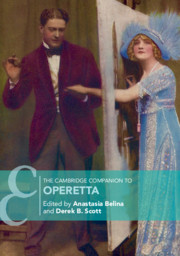Book contents
- The Cambridge Companion to Operetta
- Cambridge Companions to Music
- The Cambridge Companion to Operetta
- Copyright page
- Contents
- Illustrations
- Tables
- Music Examples
- Notes on Contributors
- Chronology, 1855–1950
- Introduction
- Part I Early Centres of Operetta
- 1 French Operetta: Offenbach and Company
- 2 Viennese Golden-Age Operetta: Drinking, Dancing and Social Criticism in a Multi-Ethnic Empire
- 3 London and Gilbert and Sullivan
- 4 Hungarians and Hungarianisms in Operetta and Folk Plays in the Late-Habsburg and Post-Habsburg Era
- 5 Operetta in the Czech National Revival: The Provisional Theatre Years
- Part II The Global Expansion of Operetta
- Part III Operetta since 1900
- Select Bibliography
- Index
- References
4 - Hungarians and Hungarianisms in Operetta and Folk Plays in the Late-Habsburg and Post-Habsburg Era
from Part I - Early Centres of Operetta
Published online by Cambridge University Press: 14 November 2019
- The Cambridge Companion to Operetta
- Cambridge Companions to Music
- The Cambridge Companion to Operetta
- Copyright page
- Contents
- Illustrations
- Tables
- Music Examples
- Notes on Contributors
- Chronology, 1855–1950
- Introduction
- Part I Early Centres of Operetta
- 1 French Operetta: Offenbach and Company
- 2 Viennese Golden-Age Operetta: Drinking, Dancing and Social Criticism in a Multi-Ethnic Empire
- 3 London and Gilbert and Sullivan
- 4 Hungarians and Hungarianisms in Operetta and Folk Plays in the Late-Habsburg and Post-Habsburg Era
- 5 Operetta in the Czech National Revival: The Provisional Theatre Years
- Part II The Global Expansion of Operetta
- Part III Operetta since 1900
- Select Bibliography
- Index
- References
Summary
This chapter provides an overview of the development of Hungary’s operetta scene and analyses the contrasts between shows written for a Hungarian audience and those created with an international public in mind. In Budapest, operetta shared the Hungarian lyric stage with the népszínmű (‘folk plays’ with music), a genre descended from the Austrian Volksstück, usually featuring more rural plots and simpler music. As time went on, operetta increasingly displaced népszínmű but continued to support shows with local plots. The latter did not serve composers well if they wished to expand their horizons beyond Hungary. I discuss Kálmán’s use of contrasting character types, such as the sophisticated European and exotic Hungarian and Gipsy, and contrast his approach with that of other Hungarian composers who wrote shows that were popular in Hungary but did not travel well. An example of a Hungarian work that draws on the operetta and népszínmű traditions is Zoltán Kodály’s Háry János. Generally labelled as a singspiel ‘symbolizing the poetic power of folklore’, using ‘genuine’ Hungarian folksong materials, it was, in fact, written and performed for the opera house rather than the commercial theatre. The chapter concludes with a brief discussion of Hungarian operetta since World War II.
- Type
- Chapter
- Information
- The Cambridge Companion to Operetta , pp. 61 - 75Publisher: Cambridge University PressPrint publication year: 2019



